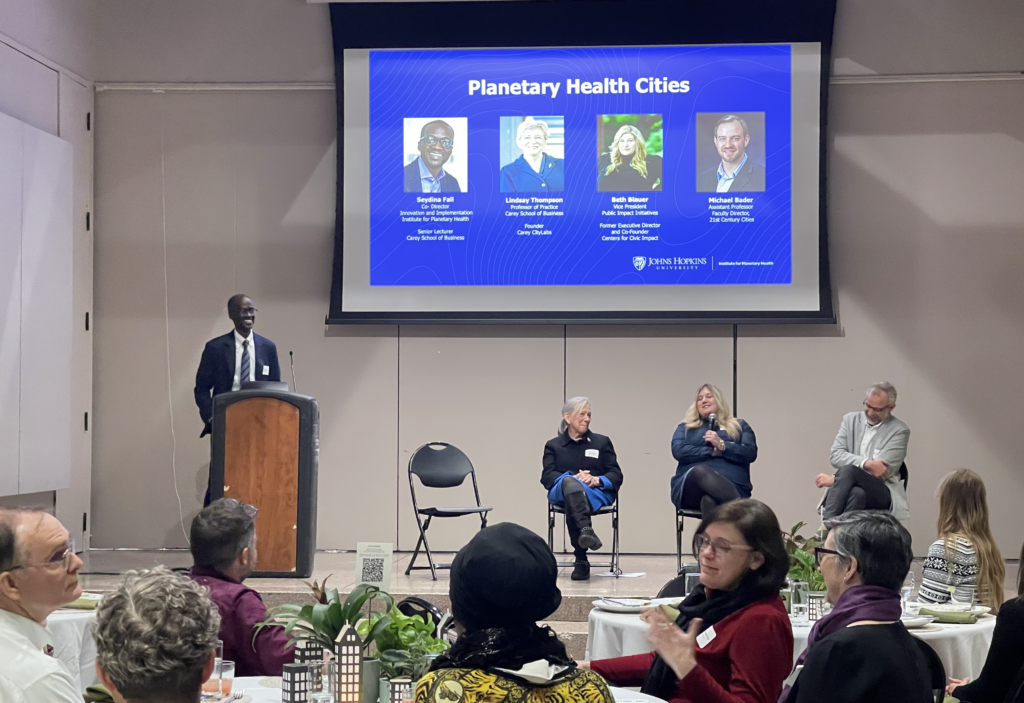
February Planetary Health Dinner
In February, members of the JHIPH community came together to explore a key question: How can we develop core principles for Planetary Health Cities that foster thriving urban communities while safeguarding our planet?
Speakers included:
- Seydina Fall, Co-director, Innovation and Implementation, JHIPH; Senior Lecturer, Carey Business School
- Lindsay Thompson, Professor of Practice, Carey Business School; Founder, Carey CityLabs
- Beth Blauer, Vice President, Public Impact Initiatives; Former Executive Director and Co-Founder, Centers for Civic Impact
- Michael Bader, Assistant Professor, Department of Sociology; Faculty Director, 21st Century Cities
Key Themes & Discussion Points
- Planetary Health Cities: The concept of Planetary Health Cities was introduced as a framework for designing urban spaces that prioritize the health of both humans and the planet. This concept seeks to unify existing urban regeneration frameworks and to combine the strong bodies of knowledge within public, private, and academic sectors to make cities more livable.
- Business Ethics: The discussion challenged the perception that profit-driven motives are inherently at odds with the environment and human health and well-being. Speakers shared their experiences working with small businesses and entrepreneurs who share the same desire for clean drinking water and safe environments to raise their children. Aligning profitability with environmental and social responsibility requires reimagining business design. One example from the real estate industry involved allocating a percentage of rental revenue to tenants, fostering long-term stability and community investment.
- Measures of Well-being and Progress: Speakers emphasized the need for measures beyond Gross Domestic Product. Progress is being made in this space, such as the Genuine Progress Indicator (GPI) and Gross National Happiness (GNH) index. Dismantling the systems that keep communities unhealthy will require continued work to decenter traditional, economically driven measures and imagine frameworks for measuring well-being and progress from a Planetary Health perspective.
- Opportunities in Baltimore: Maryland ranks among the top five “Greenest States” in the U.S., yet Baltimore lags behind other cities. This presents a significant opportunity for city government and local institutions to strategically enhance urban planning by prioritizing local hiring, workforce development, and education—key initiatives that can address labor shortages, reduce emissions, and foster long-term economic growth. Applying Planetary Health Principles to urban design would encourage co-benefits that reduce environmental harm while improving health outcomes.
- Connecting Local Entrepreneurs with Institutional Expertise: Baltimore’s small business community is growing, with entrepreneurs committed to sustainability and economic revitalization, yet many lack access to specialized expertise. By leveraging the talents of the Johns Hopkins community and connecting them with local business practitioners, we can drive innovation in net-zero housing, technology, and regenerative urban development, fostering a new era where the city is designed for smart, inclusive growth.
Upcoming Events
- Carey Business School Infrastructure Symposium– February 25, 2025, 8:30 am – 1:00 pm. Join the Johns Hopkins Carey Business School for its annual Infrastructure Symposium, featuring Amit Rikhy, CEO of Carlyle Airport Group, alongside other experts. Topics include JHU’s new Bloomberg Center as educational infrastructure, the government’s approach to public-private partnerships, and the current state of utility and energy assets. Register here.
- Planetary Health Cities Convening– June 16, 2025. A convening on Planetary Health Cities is scheduled for June 16, 2025, at the Hopkins Bloomberg Center in Washington, D.C. Stay tuned for more details!

